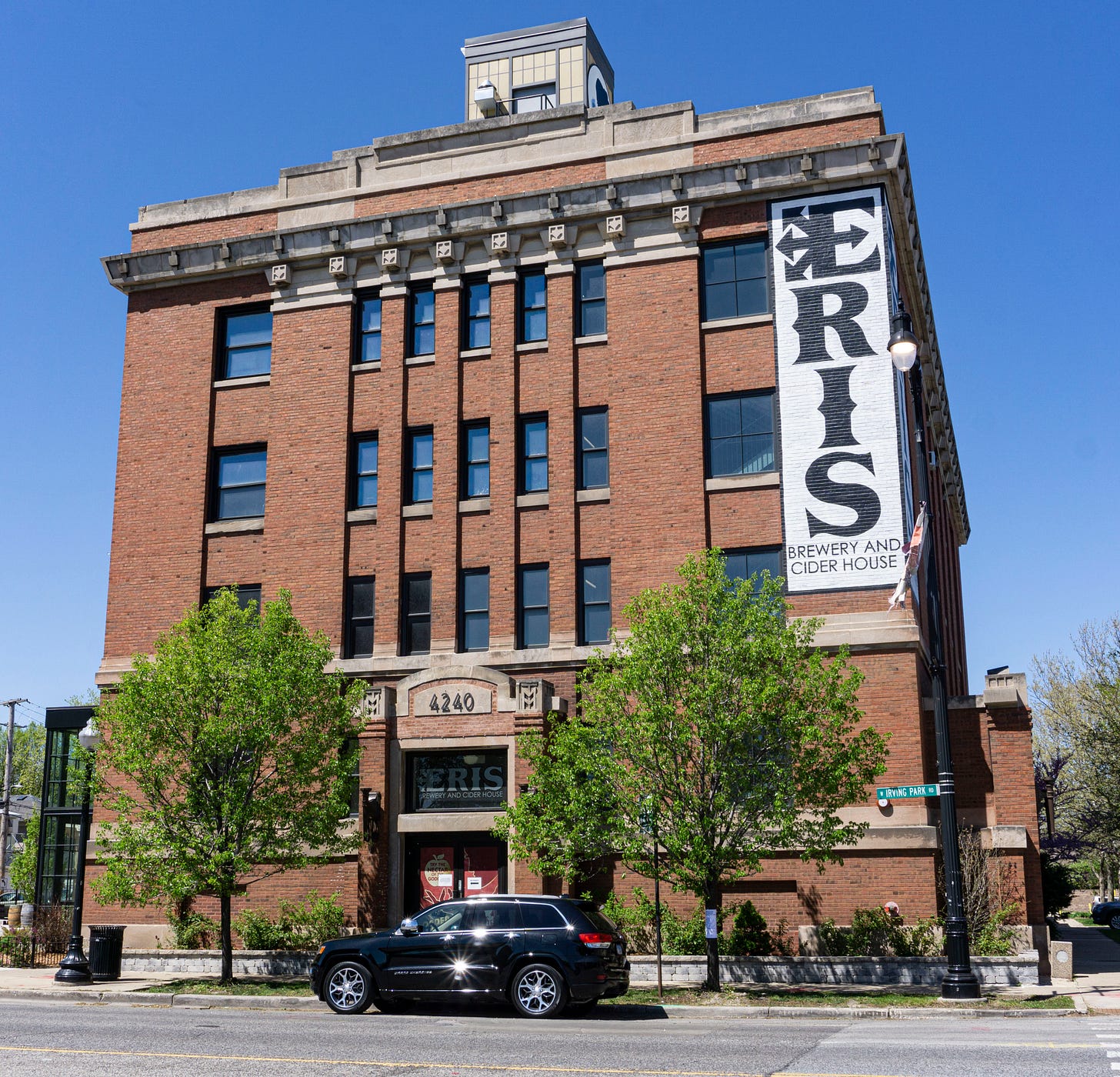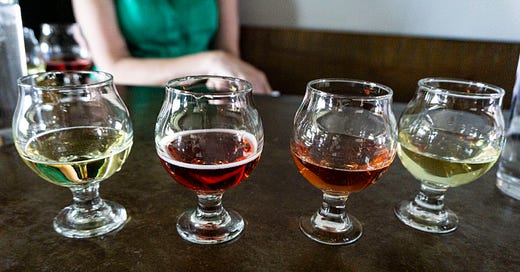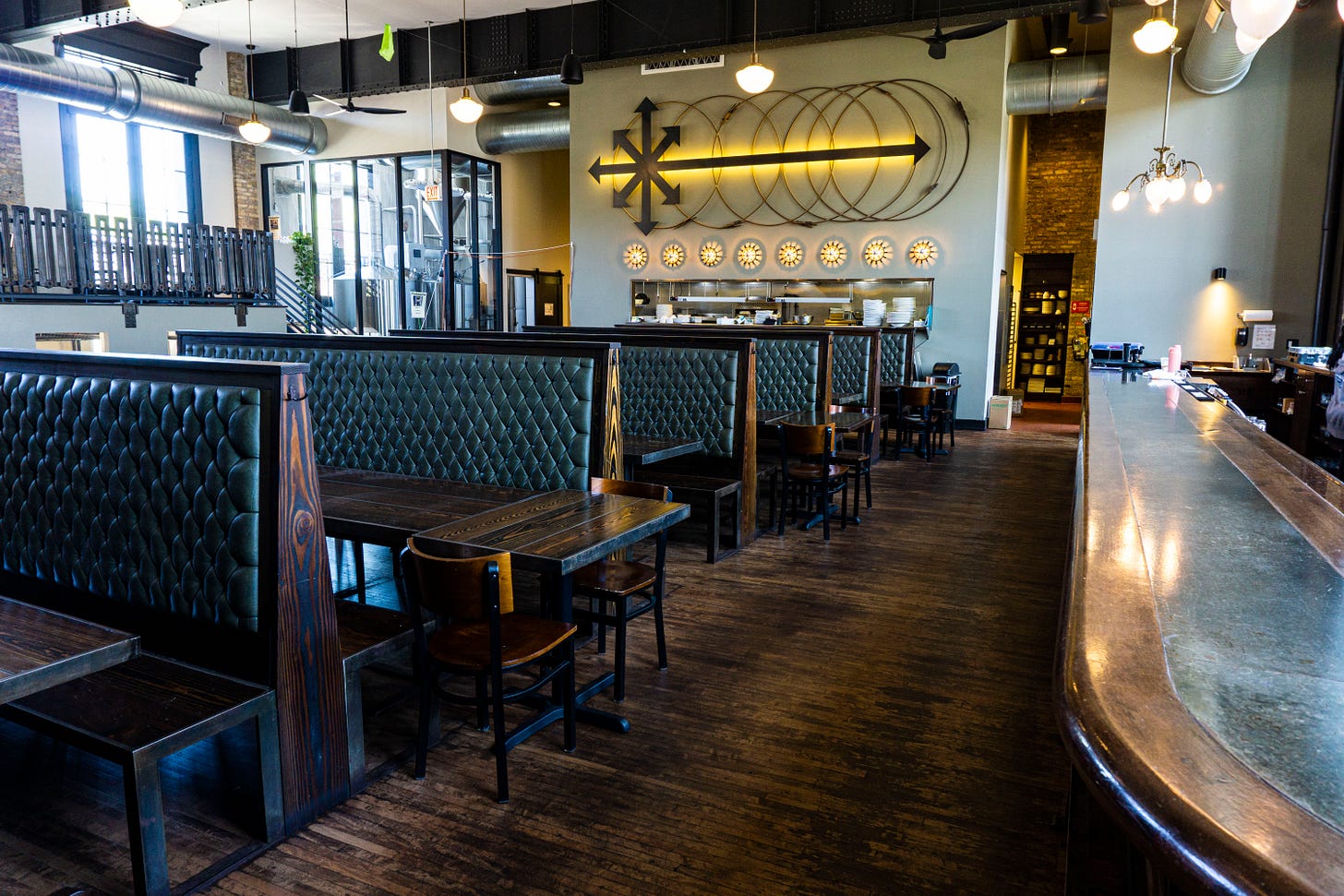How Eris' Cider Saved Its Day
Women-owned cidery/brewery was uniquely positioned to tough out pandemic
Thursday’s Chicago Metro Farmers Markets
Thursday, May 20
Weather.com Forecast: Mostly cloudy, high 81
Accuweather Forecast: Intervals of clouds and sun, high 81
LaGrange Farmers Market, 53 S. LaGrange Rd., LaGrange
7 a.m. to 1 p.m.
Lincoln Square Thursday Market, W. Leland & N. Lincoln Aves., Chicago
3 p.m. to 7 p.m.
Growing Home Wood Street Farm Stand, 5814 S. Wood, Chicago
Noon to 6 p.m.

How Eris’ Cider Saved Its Day
It is appropriate that Michelle Foik of Eris Brewery and Cider House is featured in Local Food Forum’s first craft beverage interview article. “Never forget a favor” is a good rule to follow, and Michelle did me a big one when she kick-started my transition from politics to food writing.
Michelle hosted a Revolution Beer dinner early in 2012 that I attended, and I mentioned my interest in writing about craft beer. This led to her introducing me to Nunzino Pizza, an early investor in Revolution who wanted editorial content on the website of the Michigan hop farm he had founded. My first food stories in Chicago were about brewers, distillers and hop growers.
Michelle, who was raised in a hotel and restaurant family in Wisconsin Dells, shifted her focus to traditional hard ciders when she went to work for Virtue and founder Greg Hall, for whom she previously worked at Chicago’s Goose Island Brewery (this is where the excepted q-and-a below begins).
This set her on her path to partner with Katy Pizza (Nunzino’s wife) to develop Eris (named for the Greek goddess of discord), a cidery/brewery/restaurant in Old Irving Park, a working class neighborhood that was happy to have them when they opened in 2018.
Like all dining and drinking establishments, Eris faced perilous times over the past year during the height of the COVID pandemic. But positive reviews had built Eris a loyal clientele, which helped them weather the months of carryout food and drink. So did the owners’ decision to accelerate (by about two years) the launch of their canned cider in retail.
Eris gets double local credit because it sources pressed apples from Peterson Farms in Shelby, Michigan. — Bob

———————————-
A: I really enjoyed the idea of what I was doing at Virtue. I love the way cider was being produced. Our Red Streak cider was fantastic. The other ciders that they were making, Mitten and Percheron and Lapinette, were just really fun and exciting… Eris was an afterthought. Honestly, it wasn't something that was like, oh, we're going to open up a cidery because Virtue did.
Q: So the idea started as a cidery and then it expanded.
A: Nunzino wanted to start a traditional brew pub. I really didn't. I thought there were more opportunities, but when we both sat down, he's like, let's do both, and I thought that's crazy… So crazy turned into Eris, which is the goddess of chaos.
Q: What was the process of deciding to do this thing?
A: I was very intimidated because I never started anything on my own… I met Katy and we figured out a way that I could work during the days with her and I would bartend at night to supplement the income… I had a couple of bartending jobs and I was working with another brewery that I was trying to help them see if they even want to expand… Katy's background was Project Management so she was great at creating the business plan with me.
Q: So to increase the difficulty, you decided to renovate a 110 year old church [formerly a Masonic temple].
A: This building was the only building we walked into... When we saw this one, the high ceilings and the windows and the space and walked in, I was like, this is it.
Q: So you open to marvelous reviews, the food and beverages are getting great reviews. And then bam, 14 months ago, the pandemic. What was your first reaction when things started to shut down and how did you pivot?
A: I was not gonna lie. I was scared… I think we knew after the first week that it wasn't just going to be a week… The pivot came again when it was just the realization that you got your first four or five days where you're freaking out and then it's like, okay, now time to make some really big decisions. The first thing was what can we do on a to-go schedule? Second thing was if we shut the doors and close what would this look like? And then it was the government coming out with all these new programs, loans and grants…
Katy got the brunt of having to do the financial aspects of looking into all the different programs. We are very lucky that we are a women-owned business. We got put to the top of the list, since we are a minority business.
To-go became a thing. We got a different platform, we started doing online. We noticed that our cider was a number one attraction over our beer... We also had a lot of support from our neighborhood. That helped out a lot…
I think our biggest pivot after that was extending into the patio and then getting those cans out. Our product wasn't going to get packaged for another two years. The special events room was going to make it first… But once we started putting things in cans, we saw the difference…
Q: So the light at the end of the tunnel is getting brighter. But what does the new normal look like at Eris?
A: I think the new normal is definitely the patio outside. I think another new normal is people being able to eat in colder weather. They don't mind being outside at 20 degrees when their heaters are up to about 40… They had their Long Johns on, they had those snowsuits, and people came and ate because they were just tired of being inside. It was like the Polar Bear Club for restaurants.
Q: There's a whole lifestyle entertainment aspect to this business.
A: It’s going to be like the Roaring 20s. We're already seeing it. We just need people. We don't have enough employees to cater to the needs of the people that were inside all the time, and our industry, that is one big change. We do not have the talent nor the hard-working skilled people anymore, because this job is stressful and they had found the same amount of money working at a grocery store loading up aisles. And I can't take that away from them. If we could find good help again that would be great. We’re paring down our menu because I don't have enough people on the line to expand my menu anymore than what we have right now.
Q: As a woman-owned business, when I first started getting involved with craft beer, there were virtually no women in the brewing industry, and even 10 years ago, women in brewing, they were doing front page stories of you in the Chicago Tribune food section. I know it's changed quite a bit, but how far. Are you still like role models or exemplars or is it becoming more commonplace?
A: You're seeing more women get into the industry of brewing itself. I see a lot more women that are interested in it and doing it and our associations are getting bigger and bigger, which is a fantastic thing. But when you talk about women owners in breweries, I don't know if you see as many yet. I think women are climbing the ranks of sales and marketing, which is very stereotypical of the industry, but something has to change so that we see more women owners, CFOs and CEOs in the brewing industry. …
The way we see ourselves as role models is that we are owners in an industry that people tend to think is just man-dominated. But I think Katy and I both prefer to be like, if we can help any children out at this point in time, just realize that they can fulfill their dreams, then that's the way we do it.

Take a Quiz
Hard cider is considered to be:
a) wine
b) beer
c) brandy
d) liquor
Answer: a) Cider, like grape wine, is made from fermented fruit, and is considered wine by the federal government for tax purposes. Beer and liquor are grain-based, though fruit and other flavoring agents are often added. Brandy is distilled from wine; apple brandy such as Calvados is distilled from cider.







